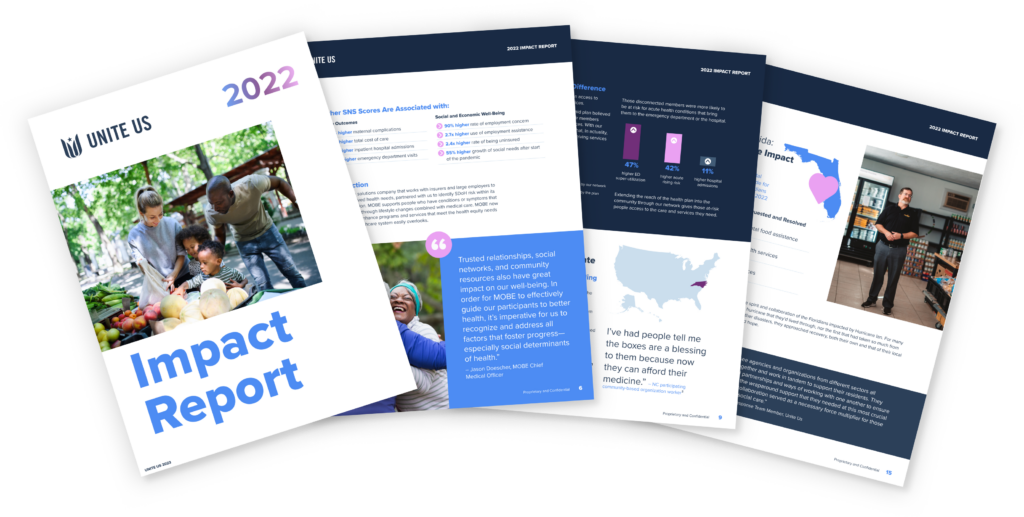
CMS Emphasizes Health Equity and SDoH in 2023 Medicare Advantage Star Ratings
Recently, the Centers for Medicare and Medicaid Services (CMS) published its 2023 Medicare Advantage (MA) and Part D Advance Notice, introducing a focus on health equity.
CMS is exploring ways to enhance measures and incentives for Medicare Advantage (MA) plans to reduce disparities among their members. We support this effort; in this article, we discuss three areas where we can offer unique insights based on our experience in health equity and data-driven impact:
1. Add SDoH into the CMS-HCC Risk Adjustment Model.
Research confirms challenges in impacting certain Star Ratings measures when high social risk factors (SRFs) are in place. CMS is exploring how additional data could enhance the CMS-HCC risk-adjustment model, and better address the impact of social determinants of health (SDoH) on health status.
Unite Us recommends focusing efforts on meaningful SDoH data.
Z-codes, surveys, and geographically aggregated data are helpful, but they have limitations (sparsely populated information or broad assumptions) that reduce health plans’ ability to act.
We believe that individual-level, SDoH data better capture the needs of Medicare members and explain variances in healthcare costs.
Our findings through the Unite Us Insights Center show that individual-level insights matter. Medicare members with elevated Social Needs Scores represent:
- Up to 9 times higher correlations to health behaviors and outcomes versus geographic level
- Poorer self-reported experiences, lower care compliance and medication adherence, and worse health outcomes
For every 10-point increase in our social needs measures, there is a 13-percent increase in cost of care.
There is significant variance in healthcare costs at each HCC risk-score tranche. Social needs can help explain it. For example, members with HCC risk scores between 1 and 2 and elevated social needs represent 76 percent higher cost of care than members with similar HCC risk and low social needs.
By combining SDoH data with clinical data, we can improve next the 12-month healthcare cost explainability by over 30 percent.
Integrating the Meaningful SDoH in CMS-HCC Risk Adjustment Model for 2023 will enable a fairer distribution of risk-adjustment funds for plans that manage highly socially complex populations.
2. Incorporate SDoH data into performance stratification.
CMS is evaluating how to report differences in contract performance on additional Star Ratings measures to account for impact of SRFs on member engagement and outcomes.
Low Income Subsidy (LIS), Dual Eligible (DE), and Disability status are critical, but not enough. Forty-seven percent of contracts have 0 percent of members on a Special Needs Plans (SNPs), and less than 25 percent of members receiving LIS. For these contracts, LIS and DE adjustment measures are less relevant to capture social vulnerability.
Unite Us has conducted exhaustive research on contract-level Star Rating performance and within-contract performance stratified by social vulnerability.
Based on our findings, the 116 contracts with high LIS (over 50 percent) and high SNP (over 25 percent) represent an average CAHPS rating of 3.37—nearly half a point less than contracts with low rates of LIS and SNP.
Within contracts, members identified as highly socially vulnerable represent:
- 30 percent higher regression on mental and physical health (Health Outcomes Survey)
- 7 percent lower care compliance and medication adherence (HEDIS and PDE measures)
- 9 percent less favorable experience with healthcare (CAHPS survey)
Including additional measures for performance stratification and additional variables for stratification—and making them publicly available—is critical to advancing health equity in the Medicare population.
3. Introduce social need performance measures into Star Ratings.
CMS is developing a health equity index to enhance Star Ratings. The index will summarize into a single score measure-level performance among those with SRFs. In this process, CMS is exploring available data to include over time.
Unite Us welcomes this effort to improve health equity among members. Consistent with our view on risk adjustment and stratified reporting, we recommend incorporating individual-level social needs in addition to proposed attributes LIS/DE/Disability status, race, ethnicity, and Area Deprivation Index (ADI).
This would enable plans to focus quality improvement initiatives to individuals with the greatest need rather than to geographies.
We further support introducing new social needs performance measures in Star Ratings, including:
- Contracts’ Assessment of Beneficiary Needs to assess whether a contract’s enrollees have had their health-related social needs assessed
- Screening and Referral to Services for social needs to assess screening and referral for interventions for unmet needs
How do we ensure effectiveness? It is important to have a consistent, accountable network of social care providers available in the community to address social needs, and consistent measurement of needs and activities, such as where referrals are going, how long it takes them to be accepted, and what the outcomes of those cases are. Screening and referral measures are a great place to start, but from there, it’s important to quickly move to understanding the outcomes of referrals and where additional investment is needed in the community.
Set your MA plan up for success in 2023
It’s critical to start developing a baseline understanding of how social needs connect to HCC risk and Star Rating performance measures in your contracts.
To learn more about our end-to-end solution for social care, visit our solutions page.
Glossary
CMS-HCC Risk Adjustment Model: The CMS-HCC or “Hierarchical Condition Category” risk adjustment model is used to adjust payments for Part C benefits offered by MA plans and PACE organizations to aged/disabled beneficiaries.
List of key measures mentioned in this article: Low Income Subsidy (LIS); Dual Eligible (DE); Area Deprivation Index (ADI); Consumer Assessment of Healthcare Providers and Systems (CAHPS); Healthcare Effectiveness Data and Information Set (HEDIS); Prescription Drug Event (PDE)
About Unite Us
Unite Us is the nation’s leading software company bringing sectors together to improve the health and well-being of communities. We drive the collaboration to predict, deliver, and pay for services that impact whole-person health. Through Unite Us’ national network and software, community-based organizations, government agencies, and healthcare organizations are all connected to better collaborate to meet the needs of the individuals in their communities.



